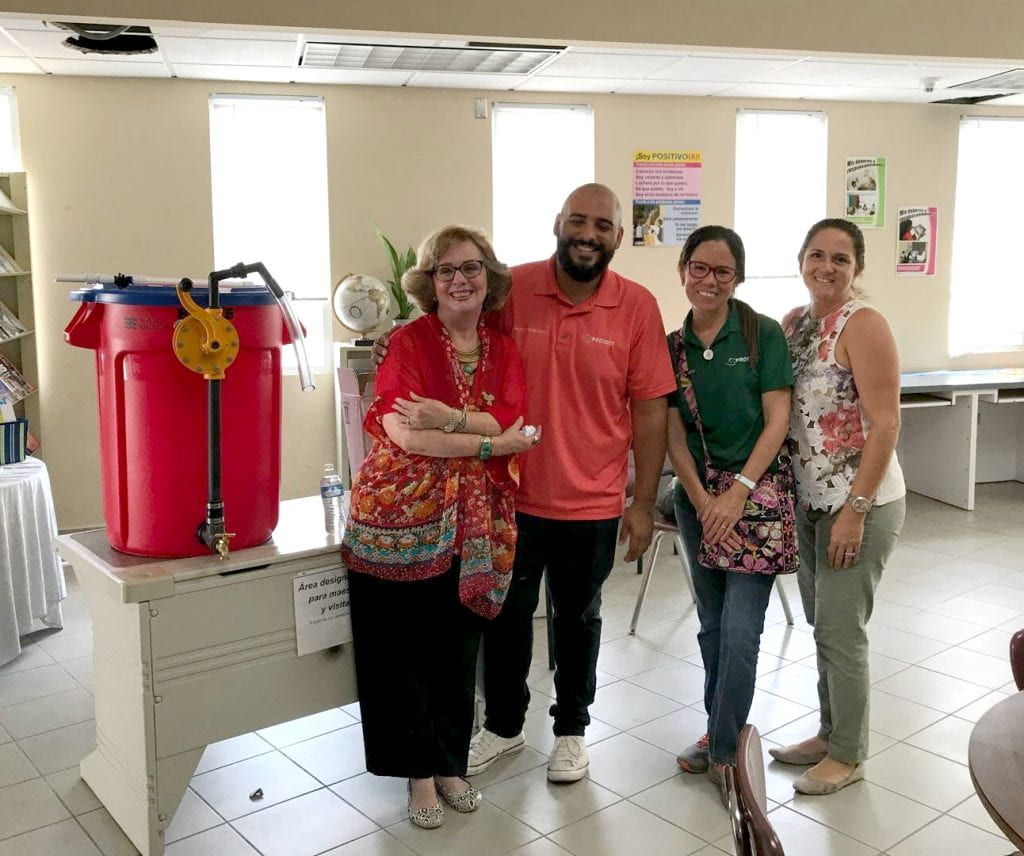Since Hurricanes Irma and Maria hit Puerto Rico in late September 2017, the CRECE and PROTECT Centers have been very active in the recovery–collaborating with other groups to ensure the safety and welfare of team members, study participants, community health center partners, and members of the surrounding communities.
 The CRECE and PROTECT teams have research partnerships with four Federally Qualified Health Centers (FQHCs) in Puerto Rico in Morovis, Ciales, Manatí, Camuy as well as with two hospitals, Manatí Medical Center and Metro Pavia-Arecibo. These and other FQHCs have provided support to obtain urgent and necessary supplies and medicine for the communities they serve. Dr. Carmen Milagros Vélez Vega, Colleen Murphy, and nurses on the CRECE/PROTECT team held discussions soon after the hurricanes with collaborators at these FQHCs as well as with study participants to identify needs that are of highest priority in the communities of the research programs. These items of necessity included drinking water, mosquito repellent, mosquito nets, hand sanitizer, insulin, nebulizers, oxygen, Pedialyte, disposable diapers, baby wipes, and baby food. Dr. Gredia Huerta-Montañez, CRECE pediatrician, has established collaboration with various organizations to provide significant quantities of these materials to the FQHCs.
The CRECE and PROTECT teams have research partnerships with four Federally Qualified Health Centers (FQHCs) in Puerto Rico in Morovis, Ciales, Manatí, Camuy as well as with two hospitals, Manatí Medical Center and Metro Pavia-Arecibo. These and other FQHCs have provided support to obtain urgent and necessary supplies and medicine for the communities they serve. Dr. Carmen Milagros Vélez Vega, Colleen Murphy, and nurses on the CRECE/PROTECT team held discussions soon after the hurricanes with collaborators at these FQHCs as well as with study participants to identify needs that are of highest priority in the communities of the research programs. These items of necessity included drinking water, mosquito repellent, mosquito nets, hand sanitizer, insulin, nebulizers, oxygen, Pedialyte, disposable diapers, baby wipes, and baby food. Dr. Gredia Huerta-Montañez, CRECE pediatrician, has established collaboration with various organizations to provide significant quantities of these materials to the FQHCs.
The CRECE and PROTECT team on the ground in Puerto Rico has joined with Master’s students at the University of Puerto Rico, School of Public Health to organize, pack, and distribute donated goods and materials. These materials have come from multiple sources, including through donations that came through the University of Georgia that were brought to Puerto Rico by Michael Welton, research fellow in PROTECT and the Zika in Pregnancy Study.
Packages have been prepared for delivery to study participants with donations received from both the University of Georgia and Northeastern University, as well as from individual donors at the request of individual staff. The packages consist of needs identified by the PROTECT Community Engagement Core and nursing staff. This effort has been constantly ongoing since the first week after the hurricane’s passage to the present.
CRECE and PROTECT are currently developing educational materials related to food and water consumption during this emergency as well as about other public health aspects relevant in the recovery phase, such as about injury prevention and appropriate generator usage. The area surrounding Dorado is of greatest concern due to reports of contaminated drinking water in the area. CRECE and PROTECT trainees in Puerto Rico are organizing a group of student volunteers to support and educate communities about the potential health impacts of drinking water near the Superfund sites.
 On the mainland, CRECE/PROTECT team members located at Northeastern University and the University of Georgia have sent mosquito repellent, non-perishable food, batteries, flash lights, solar-powered phone chargers, battery-operated fans, hand sanitizer, disinfectant, potable water filters, diapers, baby wipes, and essential drugs to Puerto Rico. These items have been distributed to study participants, team members in need, as well as to employees and patients of the FQHCs.
On the mainland, CRECE/PROTECT team members located at Northeastern University and the University of Georgia have sent mosquito repellent, non-perishable food, batteries, flash lights, solar-powered phone chargers, battery-operated fans, hand sanitizer, disinfectant, potable water filters, diapers, baby wipes, and essential drugs to Puerto Rico. These items have been distributed to study participants, team members in need, as well as to employees and patients of the FQHCs.
Aid has also arrived from various groups and organizations outside of CRECE and PROTECT, both on the mainland as well as from groups operating in Puerto Rico. The Jesuit Corporation of San Ignacio de Loyola in Puerto Rico coordinated with Dr. Gredia Huerta-Montañez to donate over fifty water filtration systems – each of which can provide dozens of gallons of potable water daily to people in the FQHCs and families in adjacent communities. Usage and management guidance on the filtration systems has been provided by team members.
Dean and Marty Rutherford from the Aquamundo and the Kumpimayo Foundation also donated nine large community water filtration systems and came to Puerto Rico to install them with the support of PROTECT trainee Héctor Torres.
 The San Juan HealthProMed Community Health Centerdonated and delivered two generators for the CRECE/PROTECT clinic in Manatí, Puerto Rico, where they were delivered and installed on October 18, 2017. The installation process turned into an important educational experience for PROTECT trainee Héctor Torres and his MPH health education student colleague, Erik García. Motivated to safeguard the health of CRECE/PROTECT staff and participants, the pair worked to learn about the potential harm gases from generators can produce and took care to properly educate themselves on proper usage and placement.
The San Juan HealthProMed Community Health Centerdonated and delivered two generators for the CRECE/PROTECT clinic in Manatí, Puerto Rico, where they were delivered and installed on October 18, 2017. The installation process turned into an important educational experience for PROTECT trainee Héctor Torres and his MPH health education student colleague, Erik García. Motivated to safeguard the health of CRECE/PROTECT staff and participants, the pair worked to learn about the potential harm gases from generators can produce and took care to properly educate themselves on proper usage and placement.
Additionally, the CRECE/PROTECT Centers have been supported in ensuring community members have access to safe drinking water by the Center for Global Health team at the University of Rochester under the direction of Dr. Tim Dye. This effort has taken place thanks to a prior established collaboration between the University of Rochester team and the Community Engagement Core (CEC) of PROTECT and the Community Outreach and Translation Core (COTC) of CRECE. Together, the teams delivered ten water purification systems on October 14 and 15, which were donated by Vestergaard Frandsen. The filters were delivered to collaborating FQHCs as well as to clinics in Vieques and Culebra. Other urgent necessities that had been identified were also delivered, including insulin and personal hygiene products for participants and staff.
Dr. Dye also received 14 tents donated to organize mobile health clinics for rural and extremely vulnerable communities lacking access to health service networks. The University of Rochester team distributed the tents in Puerto Rico from November 29-December 4 in collaboration with the CRECE/PROTECT team and the Puerto Rico Association of Primary Health Care (a longtime collaborator with the CEC). Along with the mobile clinic tents, solar generators are being provided, as well as fourteen Lifestraw Community filters and twenty family 1.0 filters. These items are being organized and delivered by Dye’s team with the assistance of various organizations, including the Ricky Martin Foundation for travel coordination.
 In coordination with the UPR Research Centers for Minority Institutions, trainee Héctor Torres and Dr. Carmen M Velez Vega are providing education and support in attaining water filters for other communities in Puerto Rico that are residing in close proximity to Superfund sites.
In coordination with the UPR Research Centers for Minority Institutions, trainee Héctor Torres and Dr. Carmen M Velez Vega are providing education and support in attaining water filters for other communities in Puerto Rico that are residing in close proximity to Superfund sites.
Questions from community members in Puerto Rico regarding water treatment and water safety have been shared with Boston University SRP colleagues, Madeleine Scammell (CEC Core Lead) and Wendy Heiger-Bernays (RTC Core Lead). In response, Gredia Huerta-Montañez of CRECE and BU SRP’s RTC Core have coordinated a community response, utilizing the expertise of scientists in Puerto Rico, on the mainland, and in Canada.
The Rutherfords (mentioned above) contacted CRECE/PROTECT staff to donate six community filters. On this occasion, the team identified various non-governmental organizations that were known to work with disadvantaged populations in the Karst region and in other areas of the island. During the donation process, a representative of these organizations was asked to participate in an educational workshop on the use, structure, and the operation of the filter. The NGOs where the water filtration systems were donated include CAUCE (Centro de acción Urbana, comunitario y empresarial), Centro de la Mujer Dominicana en Río Piedras, Escuela Adrian Torres Torres en Jayuya, Centro Comunitario de Villa Cañona en Loíza, and Escuela Juanita M (Goyita) Avilés en el barrio Franquez de Morovis.
SePARE organization of Vega Baja contacted PROTECT personnel to request various items for the expectant parents they serve. PROTECT CEC has established a trusting relationship with this organization and was able to provide them with baby wipes, baby food, diapers, and hand sanitizer.
Additionally, the March of Dimes, through its local chapter, has donated 500 Zika kits that include insect repellents, mosquito nets, and other items to prevent mosquito-borne infections.
Team members on the ground in Puerto Rico, working tirelessly on these efforts, include Dr. Carmen Milagros Vélez Vega, Zaira Rosario, Abigail Figueroa, Dr. Gredia Huerta-Montañez, Natacha Guilliotty, Carlos Vergara, Lilliana González, Krizia Santos, Ishwara Ortiz, field nurses, and student trainees Colleen Murphy, Héctor Torres, Zulmarie Diaz, Stacy Santiago, and Rafael Rios. These team members deserve the highest praise for their incredible work in spite of the personal trauma and stress they have undergone in the aftermath of the hurricanes (many have been living without electric power for more than ten weeks). While more complications and needs arise every day in Puerto Rico following this natural disaster, aid from team members and outside groups has consistently spread hope and improved health in the darkest of times.
To view more post-Maria photos from our team in Puerto Rico, visit our google photos album.

